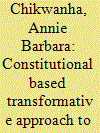| Srl | Item |
| 1 |
ID:
180623


|
|
|
|
|
| Summary/Abstract |
The article reviews contemporaneous security sector reform (SSR) models and proposes an Afrocentric human security oriented alternative, a constitutional based transformative approach. The post-colonial security sector in African countries continues to struggle with converting and infusing the nationalist liberators’ underlying values into the new institutions and this has kept post-independence security provision skewed in favour of the new political elite. Post-liberation war African countries have undergone series of SSR that depicted some semblance of stability during the transition from violent liberation struggles that were mostly fought from exile, yet the possibility of intractable conflict is real. Decades after the retreat of colonialism, the national security apparatus in the region remains a source of both instability and insecurity in many countries. This proposed SSR constitutional based transformative framework is underpinned by three core concepts: participation; accountability and transparency that undergird the core of a participatory anchored security sector governance (SSG) approach. These elements are critical factors for influencing the transformation and decolonising of the post-colonial security sector in Africa into human security focused systems.
|
|
|
|
|
|
|
|
|
|
|
|
|
|
|
|
| 2 |
ID:
181678


|
|
|
|
|
| Summary/Abstract |
This essay serves as an introduction to a special section on the senses in late colonial India. Participating in the act of decolonising sensory studies, this collection explores the intersections between post-colonial studies and sensory studies by paying particular attention to the sensorium of the colonised. In the historical and geographical context of colonial South Asia, the senses are embedded in acts of distinction across race, caste, class, and bodily and gender hierarchies. The collection intervenes by paying attention to the relationship between power and sense perception as it finds register in media, scientific practices and literature of the period. Across the section, we suggest that making sense of empire is also to make sense of the sensory regimes of empire that have resonances in the contemporary.
|
|
|
|
|
|
|
|
|
|
|
|
|
|
|
|